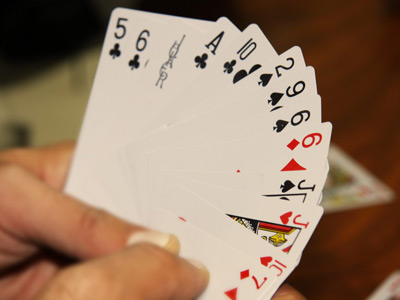A visitor to Mumbai doing his or her rounds with friends on Diwali day would perhaps be shocked at the vigorous gambling activity that goes on in several households.
A large apartment of an opulent member of the friendly group would play host as men and women gather around 7 pm. Food and beverages of all kinds would keep flowing as the groups begins to play cards-the stakes would depend on the financial ability of the group. The evening turns into night and wee hours of the morning.
And by breakfast time, each member would count how much was won or lost and in the tally, a few thousand dollars (or rupees) would have changed hands.
Gambling on Diwali day? Is it not against the religion? Is it not a bad social habit?
As for the first two questions, the answer is, ‘Why not?’ There is nothing irreverent about gambling. Says a scholar: “One of the most curious customs, which characterises this festival of Diwali, is the indulgence of gambling, especially on a large scale in North India. It is believed that Goddess Parvati played dice with her husband, Lord Shiva on this day and she decreed that whosoever gambled on Diwali night would prosper throughout the ensuring year.”
Spiritual approval
Vatsyayana, a great Indian sage, has ordained gambling be a part of the Diwali celebrations, which also mark the Night of the ‘Yakshas,’ or celestial beings.
“Houses should be illuminated with the light of tiny earthen lamps placed in rows close to each wall and window ledges, and the gardens should have bonfires on the Yaksha Night, which is the Festival of light and merriment,” he said.
“Thus, Vatsyayana’s Yaksha Night was celebrated with light, merriment and gambling, that has continued ever as a part of Diwali celebrations,” Nitin Sharma, editor of exoticindia.com writes in this Special Report (‘Origins of a great festival before Christ’).
Readers of the great Indian epic ‘Mahabharata’ would know that Dharma, the eldest of the Pandava brothers not only pledged his entire kingdom but also his wife and lost everything to a game of dice. Gambling in one form or the other has thrived in India for thousands of years and Diwali is just one occasion to relive the days of ancestors!
Royal habit
This tradition of playing cards-flush and rummy with stakes continues unabated. For adults, the custom of indulging in gambling during Diwali, is an omen of the luck that would ensure throughout the New Year. It is all in fun, though, in a spirit of light-hearted revelry and merry making.
Those who raise eyebrows are asked a simple question: “How is it that every state government in India deliberately plays on the ‘greed’ of people with their respective lottery schemes?”
They also provide the answer: “Some of the advertisements that appear on television are not only repulsive but also anti-national. It is better to play a few games of cards at least once a year for pure pleasure than to subscribe to the lottery schemes and lose every day!”
Television shows
There are numerous game shows on television these days, the most popular of which is ‘Who wants to be a Millionaire?’ Originating in Britain, the programme is today televised in more than 100 countries in many national and local languages.

Participants in this programme do not ‘gamble money,’ since they do not pay for the stakes, but ‘gamble luck,’ for the top prize, which is usually a million in the national currency (million pounds in UK, million dollars in Australia and so on).
For some people in North India, the festival commemorates the joyous return of Rama to his Kingdom of Ayodhya, after 14 years exile in the forests and to some others, it also denotes the return of wealth lost by kings in gambling.
For the business community, Diwali is a festival devoted to Lakshmi, the Goddess of Wealth and Prosperity. For the merchant community, in fact, the new accounting year begins with Diwali and the tradition is still followed by opening new accounting ledgers on this festive day. In this region, Diwali is a two days celebration the days known as ‘Choti Diwali’ and ‘Badi Diwali’ (literally, ‘Small Diwali’ and ‘Big Diwali’). Diwali on both successive days are on one hand signified by exchange trays of sweets, tasting from each to see which family had the most exotic preparations.
It is the perception of the business community that gambling on Diwali day leads to victory and success on this auspicious day would lead to happy days throughout the year. Such a perception has lured other members of the society to this annual habit.
From time to time, questions are raised as to whether card playing for money does not contravene the laws in force in India but no one gives this a serious thought.






